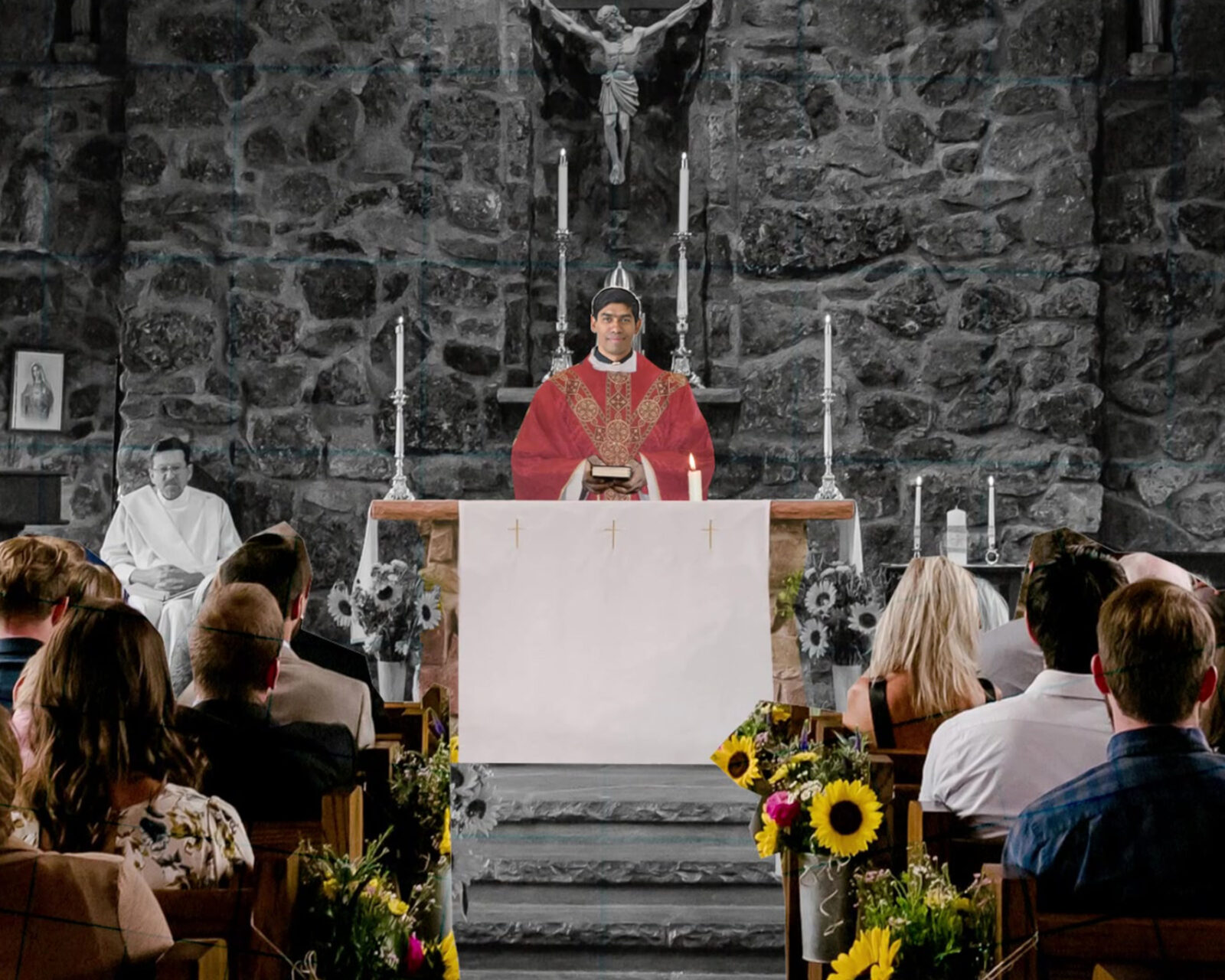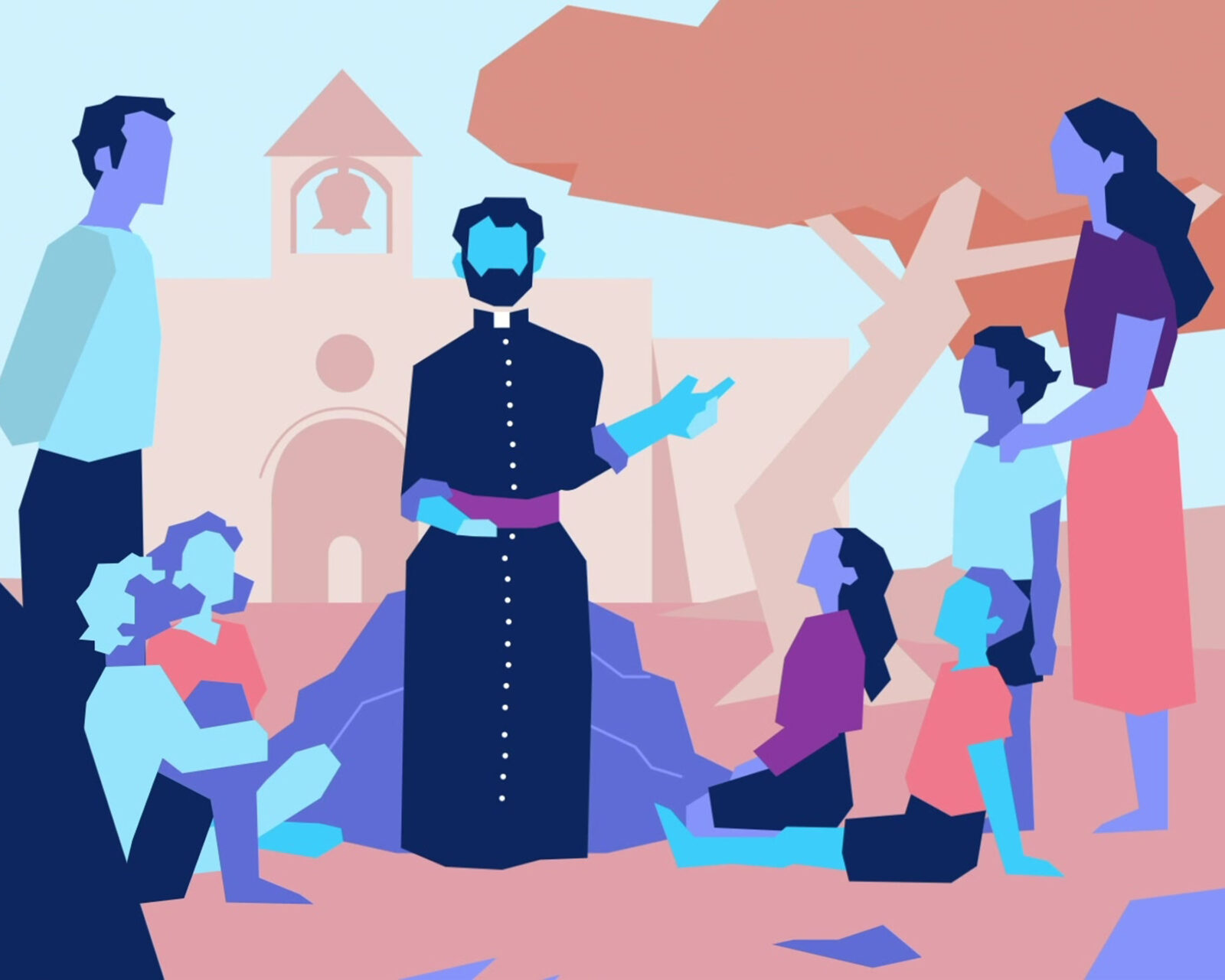Why does the Catholic Church have priests?
Proclamation

These ordained men are set apart to continue Jesus’ ministry and play an important role by preaching, offering the Sacraments, and serving “in the person of Christ.”
WatchPriestly formation includes human, spiritual, intellectual, and pastoral formation in seminary. During this time, a man enters deeply into prayer and learns to listen well to God.
Proclamation

These ordained men are set apart to continue Jesus’ ministry and play an important role by preaching, offering the Sacraments, and serving “in the person of Christ.”
WatchExplanation

Priests play a unique role in the Church because they, in a special way, are the hands and feet of Jesus and allow us to receive the sacraments and hear…
WatchConnection

Bishops, priests, and deacons all receive an imprint in the sacrament of Holy Orders that cannot ever be removed, but play three distinct roles in the sacramental life of the…
WatchEdmund: One thing that drastically changed my experience of the Church was getting to know priests better. As a kid, I think I just assumed that priests were always priests, and I really carried that into adulthood without realizing it. And the lives of priests and even all the events leading up to someone becoming a priest can be really vague for people. Like how does someone go from being a kid who likes video games and pizza to growing up and becoming a priest in the Church? So two things, really. Getting to know priests personally and having friends that are priests really changed my experience of the Church, but then also understanding the discernment process that they go through in order to become a priest. I want to introduce you to Father Edward. Now, I remember Father Edward back when he was a seminarian, and I got to know him as this just like normal guy and watch him go through this process of becoming a priest. And when you get to know him, like he’s a, he’s a fantastic guy, he’s a fantastic priest. So I also wanna share with you this discernment and formation process. Now, we should make a distinction that there’s a difference between priests who are in a religious order, Franciscans, Dominicans, Jesuits, things like that, and priests who work in a diocese at a parish. So today we’re gonna be focusing on the process the man goes through to become a diocesan priest. So the first step is discerning that God might be calling you to the vocation of the priesthood and reaching out to your diocesan vocations office. And they’re gonna have a lot of resources, events, and people that you can talk to, to help walk through and understand more deeply what this vocation is all about. And this is much like what discernment should happen before two people decide to get married. Both people are discerning if this is something God is calling them to. And until that last moment when you say “I do” you’re discerning. Now, in the past, long ago, the process of becoming a priest was much like an apprenticeship. So a man would go and really live alongside a priest to understand what it actually looks like to be a priest. And today, different diocese have different specifics regarding the formation process and the discernment process, but there are a few commonalities. So after a man reaches out to the diocese and starts this process, they’ll then be evaluated to see if they’re properly disposed and prepared for seminary. The requirements for entering seminary and the requirements for becoming a priest are that the candidate be a male who’s a Catholic in good standing, has received all their sacraments of initiation, and that they’re healthy physically, mentally, and spiritually. During seminary, there’s this process of human, intellectual, spiritual, and pastoral formation that occurs. Seminarians take classes, they meet with spiritual directors often, and they live in community with other men who are discerning the priesthood. A lot of people don’t realize how much theology, but also philosophy, education, and training that priests receive before they are ultimately ordained a priest. So in a way, a seminary is a lot like a university or college. Once a man enters seminary, he’ll go through four main stages of formation. The church calls them the propaedeutic, discipleship, configuration, and vocational synthesis. Don’t get hung up on those words. The first is propaedeutic. This is often a year, and it’s a time where a man is preparing to enter seminary and he’s really building a solid foundation of a prayer life and a way of life that’s gonna be conducive for living in fraternity with other, uh, men who are discerning the priesthood and living this life of intense formation and prayer. The second is the stage of discipleship. This shouldn’t often be less than two years, and this is where they’re taking a lot of foundational classes. This stage has the goal of growing an intimate relationship with Jesus Christ through meditation, contemplation, philosophical study, and training in Christian virtue. Now, a third stage is configuration. And this is fun because they get to start wearing that black shirt and the white collar, they’re called clerics. And this is specific clothing worn by the clergy outside of the liturgy. It sets them apart. Now at this stage, a man is starting to take more graduate level classes where they’re being more specific on theological topics or sacraments, things like bioethics, the Mass, grace. And this is also a stage where they start taking what’s called practica. These are very hands-on practical things where they’re learning how to celebrate the sacraments or how to preach. At this stage, a man also has pastoral work, which is assisting at a parish or a hospital or in some type of evangelization program or ministry. If dating was the analogy for this, this is like the engagement stage. And at the end of this stage, the man has actually ordained a deacon. And the last stage is called vocational synthesis. This is synthesizing everything that this man has been learning and been formed in up until this point. And they’ll live in a parish for a period of time while they prepare for that final step of being ordained a priest. And finally, after all of this work of formation and training and experiences, they are finally ordained a priest forever by the bishop of their diocese. And all along the way, a man is still discerning his call to the priesthood. He’s listening to his spiritual directors and to his experiences in pastoral life. And it’s really a two-way street. The bishop and the seminary formators, spiritual directors, are really trying to help discern if this is in fact the vocation that God is calling this man to. Getting to know all the work and all the discernment that goes into the formation process, really helped me respect and understand priests a lot better, as well as just getting to know them. I mean, priests are ordinary men. And to go through this long process, I mean, it takes a special person to go through this whole formation process for love of the Church. And Jesus, we should be so thankful that we have priests in the Church and that men answer this call. I mean, we should be praying for our priests and getting to know them, and we really need holy and and good priests who love the Lord and love the Church, and love shepherding and pastoring the flock. And this is why seminary prepares men to enter into the sacrament of Holy Orders and to continue Jesus’s ministry in the Church until he comes again.
U.42 — CCC 2807-2815

What does it truly mean to live in the name of Jesus? Learn from the martyrs.
WatchU.41 — CCC 2759-2806

Let the words of the Lord’s Prayer fill your heart, mind, and soul as you grow closer to God as Our Father.
WatchU.40 — CCC 2697-2758

Learn from Jesus’ example of stepping away to pray, and explore how you can create your own “daily monastery” for prayer and reflection.
WatchU.39 — CCC 2650-2696

The Catechism reminds us that while we can’t control the Holy Spirit, we can prepare our hearts and minds for prayer by relying on the Church’s “wellsprings” of prayer.
WatchBy submitting this form you consent to receive emails about Real+True and other projects of OSV.